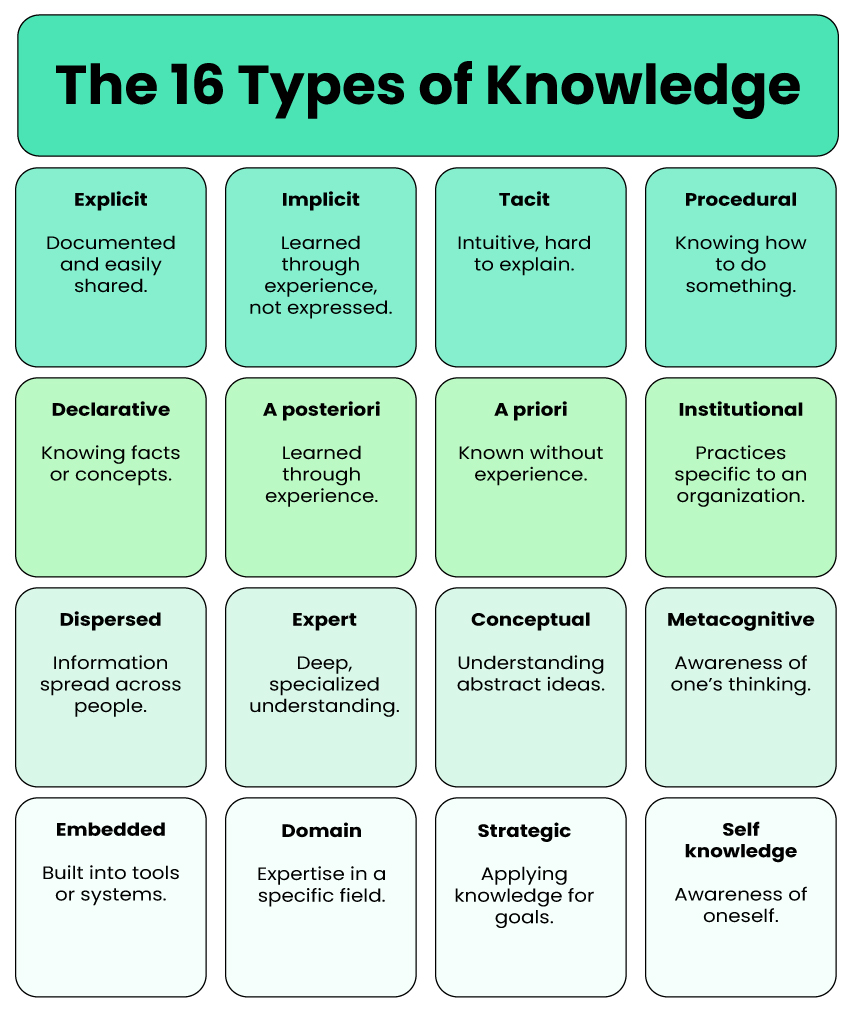Knowledge
Types of Knowledge
Knowledge can be broadly categorized into several distinct types, each with its own characteristics and applications:
Explicit Knowledge
- Definition: Knowledge that can be easily articulated, documented, stored, and retrieved. Think of manuals, reports, articles, and databases.
- Characteristics: Objective, logical, technical, easily shareable.
- Examples: Company data sheets, research reports, written customer service scripts.
Implicit Knowledge
- Definition: Knowledge that is understood and applied but not formally documented, often gained through experience. It is the practical application of explicit knowledge.
- Characteristics: Less transparent and harder to explain than explicit knowledge, often acquired unconsciously.
- Examples: Knowing how to effectively communicate in different situations, understanding team dynamics, discerning a customer’s mood based on non-verbal cues.
Tacit Knowledge
- Definition: Deeply embedded, intuitive, and experiential knowledge that is difficult to articulate or transfer. It is often unconscious and personal.
- Characteristics: Personal, context-specific, acquired through experience, intuitive, and informal.
- Examples: Language fluency, intuition, wisdom, experience gained through hands-on practice, riding a bicycle, kneading dough, knowing when a customer is getting frustrated.
Declarative Knowledge
- Definition: Knowledge about facts, concepts, and principles – the “knowing that”.
- Characteristics: Can be declared or stated, provides the foundation for other forms of knowledge.
- Examples: Knowing that snow is white, knowing the rules of grammar, understanding historical facts.
Procedural Knowledge
- Definition: Knowledge of how to do something or how to perform a task – the “knowing how”.
- Characteristics: Exercised in the performance of a task, often difficult to articulate.
- Examples: Knowing how to change a flat tire, playing an instrument, navigating to a room, using a specific computer program.
A Priori Knowledge
- Definition: Knowledge that is independent of experience, relying on reason and logic.
- Characteristics: Can be known through pure thought, deduction, or reflection.
- Examples: Mathematical truths (e.g., 1 + 1 = 2), tautologies (e.g., “all bachelors are unmarried”), logical deductions.
A Posteriori Knowledge
- Definition: Knowledge that is justified based on observational or empirical evidence, and experience.
- Characteristics: Requires input from the senses or reliance on experience.
- Examples: Personal experiences, scientific knowledge, historical knowledge, knowing that broccoli is green because you’ve seen it.
Metacognitive Knowledge
- Definition: An individual’s understanding of their own cognitive abilities, learning strategies, and when to apply specific strategies.
- Characteristics: Includes declarative, procedural, and conditional knowledge about one’s own thinking processes.
- Examples: Knowing that you learn best through visual aids, understanding how to use a mind map for studying, recognizing the effectiveness of summarization for certain subjects.
Other Notable Types
- Conceptual Knowledge: Understanding the underlying ideas and principles.
- Embedded Knowledge: Knowledge ingrained in an organization’s processes, systems, products, and culture.
- Institutional Knowledge: The collective understanding, skills, processes, and historical context accumulated by an organization over time.
- Domain Expertise: Specialized knowledge within a particular area or field.
These types of knowledge are interconnected and often work together to contribute to an individual’s or an organization’s overall understanding and capabilities.

Quotes
- People may differ in beliefs, they can differ in faith, but knowledge, true knowledge, is universal. ― Paramahamsa Vishwananda, Bhagavad Gita: Essentials